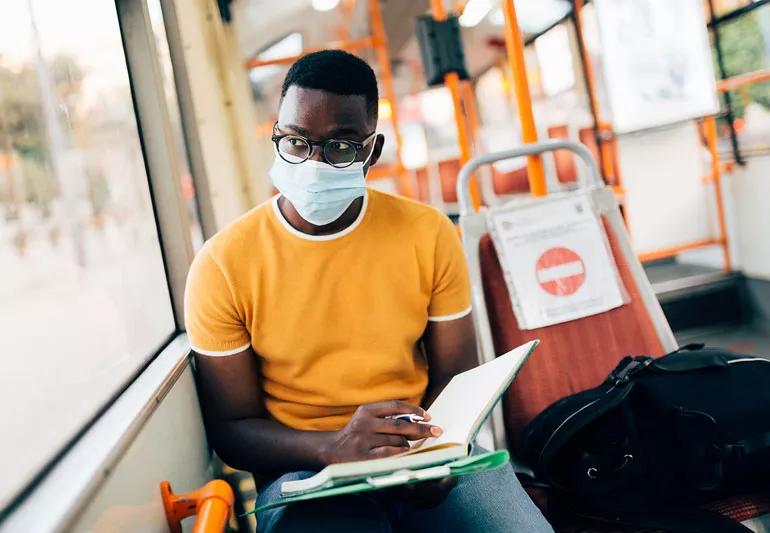Extra precautions can help prevent the spread of COVID-19

Image content: This image is available to view online.
View image online (https://assets.clevelandclinic.org/transform/03e849d9-a0a9-4284-a886-2f12d27bb594/covidCollegeStudentHome-1269961472-770x533-1_jpg)
college studing taking bus home during covid
Usually, when college students make the trip home for a holiday or winter break, they look forward to catching up with family they haven’t seen in a while and reuniting with old friends. But, as we all know, this year is anything but usual.
Advertisement
Cleveland Clinic is a non-profit academic medical center. Advertising on our site helps support our mission. We do not endorse non-Cleveland Clinic products or services. Policy
Instead, as the holiday 2020 season nears, many college students face a dilemma: They want to be home for the holidays, but they also don’t want to risk bringing COVID-19 home with them.
Whether students stay put on campus or come home is a personal decision that will be different for each family. If they do come home, they should do so carefully.
Healthy young adults generally aren’t at high risk for getting extremely sick with COVID-19. But pulmonary and critical care specialist Joseph Khabbaza, MD, says students attending classes in person may fall into a higher risk category of being carriers and spreaders of COVID-19.
“Anyone who’s in full-time school, that’s going to be a bit higher risk,” he says. “I think part of the challenges of school-age children and young adults in college is that they tend to be the ones that are going to be minimally symptomatic if they are infected with COVID-19.”
Both the process of traveling and the coming together of separate “households” increase the risk that COVID-19 could spread. Following the steps below could help minimize the risk.
To reduce the potential of unknowingly spreading the coronavirus, students should limit their social activities 7 to 14 days before going home.
Advertisement
They should also be on the lookout for any potential COVID-19 symptoms such as fever, cough or body aches. If their school offers COVID-19 testing, it’s a good idea for students to get tested a few days before they leave for break and, if they’re positive, stay put to avoid putting others at risk.
If students will be traveling through busy airports, train stations or other public places, it’s very important that they stay cautious. They should always wear a mask, stay 6 feet away from others when possible and wash their hands frequently.
Once they arrive, students who have not been able to quarantine before returning home should wear a mask indoors, especially around loved ones who are elderly or have a compromised immune system.
“That’s a tough sell to wear a mask at family gatherings, or perhaps in your own home, but it’s really an extra precaution to protect the most vulnerable,” says Dr. Khabbaza.
If possible, it’s best for students to sleep in a separate bedroom and use a separate bathroom from others once they get home. They should also avoid sharing eating utensils, dishes or glasses with other people unless they’ve been washed.
It’s also important that they continue to take the recommended precautions when they go out in public.
By making thoughtful choices, college students can help protect their loved ones and themselves this holiday season.
Advertisement

Delivered every Tuesday!
Sign up for our Health Essentials emails for expert guidance on nutrition, fitness, sleep, skin care and more
It's a letter about the news!
Learn more about our editorial process.
Advertisement
The short answer: It’s complicated, but the basic care precautions still prevail, like washing your hands and isolating if you’re sick
They can feel like a typical headache or a migraine headache, but the pain can last for weeks to months
Any large social gathering — from a family birthday party to an indoor music concert — has the potential to spread serious infection
It’s important to connect with a healthcare provider, get quality sleep and balance your activities with your energy levels
Just like the flu, COVID-19 will continue to evolve every year
The duration varies, but symptoms can linger for a few days up to a couple weeks or more
Vaccination is best for prevention, but if you get sick with COVID-19, treatments are available
The virus lives best in humans, but it can last on hard surfaces, like doorknobs and railings
Type 2 diabetes isn’t inevitable with these dietary changes
Applying a hot or cold compress can help with pain
Pump up your iron intake with foods like tuna, tofu and turkey